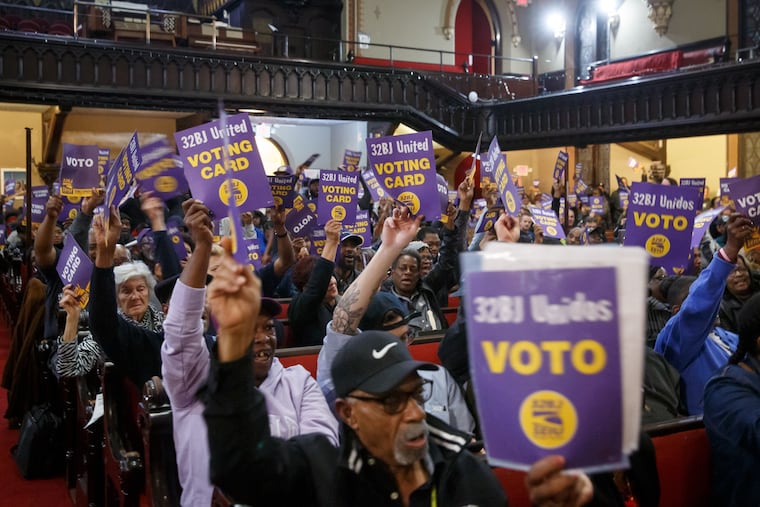Workers who clean Philadelphia’s business towers reach new contract with management
Through their union, the workers have been able to transform these jobs into what’s become a rarity: the service job you want to hold on to. They now fear that their employer's recent proposals would chip away at the progress they've made.

When Vincent Jones was among the first black students to attend Girard College, a housemaster told him and his classmates, “You guys gotta study or you’re gonna be mopping somebody’s floor.”
Decades later, Jones, 56, of West Philadelphia, is mopping someone’s floor, at the Market East office high-rise newly renamed Jefferson Tower. He’s been a porter — a fancy word for janitor, he says — for nearly two decades. And although he knows that some people, like that housemaster, might think his work is menial, he takes pride in it. It’s rewarding, he says, to keep the Center City office towers in beautiful shape, to build a rapport with the office workers he sees everyday.
Most of all, he’s been able to support his family — three grown children and five grands, as he calls them — through the job.
“That’s all you want in life, right?" he says. "To take care of your family.”
Jones is one of 3,000 workers who clean and service about 120 office buildings in Center City and University City, including the FMC Tower, the Comcast towers, and the Peco building. The workers, largely African Americans or immigrants, have been union members for nearly a century, making them among the first low-wage service workers to be unionized in the city. They have been able to transform these jobs into what’s become a rarity: the service job you want to hold on to. The average cleaner makes $17 to $19 an hour, has a pension, and doesn’t pay premiums for good health insurance.
» READ MORE: The health care industry is growing, but not all jobs are equal. For Hahnemann workers, what are the prospects?
Late Tuesday, Jones’ union - Local 32BJ of the Service Employees International Union - reached an agreement with building owners on a new four-year contract. The agreement on a tentative pact was confirmed by union spokesperson Julie Blust and Bob Martin, president of Building Operators Labor Relations (BOLR), which negotiates on behalf of the owners.
Neither would provide any details of the agreement. Blust said the local membership would vote sometime in the next two weeks. The membership last week had authorized leaders to call a strike if necessary after the last contract expired at 12:01 a.m. Wednesday.
Center City on the rise?
Initial proposals from BOLR, which runs labor management for the Building Owners and Managers Association of Philadelphia, included no wage increase, a freeze on pensions, and a requirement that workers pay $300 a month for health insurance, 32BJ SEIU said. (BOLR negotiates these contracts, but most of the workers are employed by such contractors as the Arthur Jackson Co., GDI Integrated Facility Services, and ABM. Some maintenance workers are employed directly by buildings.)
That didn’t sit well with union members, who point to the growth in local commercial real estate over the years.
“Center City is on the rise,” Jones said. “We just want it to trickle down to us.”
» READ MORE: Parkway seeks to build Center City rarity — a new office tower — where porn theater stood
The industry has certainly been growing, due to such major projects as the Comcast Technology Center and the FMC Tower, said Lauren Gilchrist, Jones Lang LaSalle’s senior director of research, She added, however, that rents have risen only about 3% a year, on average, significantly slower than markets in New York, San Francisco, and Boston. Vacancy rates have continued to hover between 9% and 11%, she said.
Some office buildings where the cleaners work don’t have to pay the city property taxes. Comcast will not pay property taxes on its new tower until 2027 because of the city’s controversial 10-year tax abatement. The FMC Tower near 30th Street Station is in a Keystone Opportunity Zone, which offers businesses tax abatements and credits to spur development.
» READ MORE: $29.6 billion of Philly real estate is exempt from property taxes. Should nonprofits be asked to pay up?
The Philadelphia Inquirer is one of 21 news organizations producing Broke in Philly, a collaborative reporting project on solutions to poverty and the city’s push toward economic justice. See all of our reporting at brokeinphilly.org.